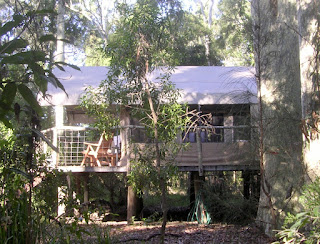The ultimate indulgence of my (Joan’s) prediliction for the offbeat came with our stay at Paperbark Camp near Jervis Bay, which describes itself as part of the trend in “nature based tourism and ecologically sustainable development.” I just thought it sounded neat to sleep in a tent, having not done so since Girl Scout camp in the Ozarks (also--like Australia--home to several venomous snakes).
The accommodation essentially consists of a platform on stilts on which rests a large tent with mesh windows and a canvas roof.
The "bathroom" was behind the tent on the platform, more or less in open air, and included a flush toilet and a surprisingly hot shower. We hoped we were sheltered from our neighbors’ view when we used the bathroom. There are 12 tents, given names like “Wombat,” “Bandicoot,” and “Penquin.” A solar panel charges a battery that provides the bathroom and bedside lights inside.
The "bathroom" was behind the tent on the platform, more or less in open air, and included a flush toilet and a surprisingly hot shower. We hoped we were sheltered from our neighbors’ view when we used the bathroom. There are 12 tents, given names like “Wombat,” “Bandicoot,” and “Penquin.” A solar panel charges a battery that provides the bathroom and bedside lights inside.
Guests dine in an architecturally interesting structure containing the Gunyah restaurant (it is an Aboriginal word meaning “meeting place”, the same origin as the name Canberra), offering candle-lit dinners under the gum trees by the verandah. The cuisine is excellent--featuring such dishes as fresh oysters (delicious) and kangaroo meat steaks (we declined: it would be like eating Bambi).
Upon checking in and being shown to our tent, we were instructed to keep the zippers closed at night with a carabiner, to keep out the brush-tailed possums that inhabit the surrounding bush. Above all, we were told NOT to leave ANYTHING remotely edible in your tent at night, or you’ll be overrun with possums, which can smell food from far away. They have even been known to swipe shampoo and cosmetics left out in the “bathroom.”
We sat on our front deck, swatting away the “mozzies” that became fierce at dusk. At that time, we thought that, as promised, the bush would come alive with wild creatures. With anticipation, we turned out the light, but saw no wildlife with the flashlight provided to all guests. We turned out the light to go to sleep, the drone of cicadas in the air—a taste of primordial “life in the bush.”
At dawn, we were awakened by a cacophony of bird noises. And I mean a real cacophony, not the melodies of little songbirds (not the famously sweet British morning chorus). David told me he lay awake for half an hour thinking of all the words that might describe what we heard—screeching, wailing, bleating, cheeping, laughing, mocking, squawking, hooting, whooping—ad nauseam. So much for turning over and having another hour’s snooze.
The main activity right at the resort, besides swatting mosquitoes, is canoeing on the adjacent Currambene Creek, which flows down to the town of Huskisson (self-proclaimed as “Australia’s first coastal plastic bag-free town”, but more importantly containing a drive-through beer store). We had an early morning paddle, in which the creek-side trees and bush were perfectly reflected on the water.
The Camp was an unusual place, certainly a far cry from the Adelphi Hotel, Melbourne. And it had no television—an ecological no no, perhaps?--so we could not watch the final of the Australian Open, being played only a few hundred miles away, which the rest of the world was able to view.










Flush loos in the bush! What luxury. It wasn't like that in Scout Camps at Clearbrook . Glad you're safely home, though.
ReplyDelete